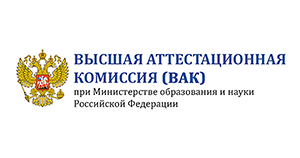|
Перейти
на сайт журнала "Врач" |
Перейти на сайт журнала "Медицинская сестра"
|
Перейти на сайт журнала "Фармация"
|
Перейти на сайт журнала "Молекулярная медицина"
|
Перейти на сайт журнала "Вопросы биологической, медицинской и фармацевтической химии"
|
Журнал включен в российские и международные библиотечные и реферативные базы данных
|
ВАК (Россия)
|
РИНЦ (Россия)
|
Эко-Вектор (Россия)
|
THE FREQUENCY OF SOMATIC MUTATIONS IN EGFR GENE IN SMOKING AND NON-SMOKING PATIENTS WITH LUNG ADENOCARCINOMA
DOI: https://doi.org/10.29296/25877313-2019-04-06
Issue:
4
Year:
2019
Lung cancer is one of the most common malignancies in the world. On the territory of the Russian Federation, in particular the Novosibirsk region, there is an increase in the number of morbidity and mortality from lung cancer. There are many factors leading to the development of this disease, such as smoking, environment, etc. One of the possible options for the development of lung cancer are activating mutations in the gene for the receptor of ep-idermal growth factor (EGFR). Activation of EGFR plays a crucial role in tumor proliferation, survival and metastasis, so EGFR is a target for targeted ther-apy. The frequency of activating mutations in the EGFR gene depends on many factors, including regional features. For example, the frequency of such mutations is particularly high in non-Smoking women in East Asia. The purpose of this study is the analysis of the prevalence of non-small cell lung cancer, particularly adenocarcinoma of the lung in the Novosibirsk region, and the frequency of its occurrence depending on the Smoking and the presence of mutations in EGFR in men (n=352) women (n=197). The results of the study showed that lung adenocarcinoma occurs in male smokers in 52.3%, and non-smokers in 43.5%. At the same time, mutation in EGFR in non-Smoking men (6%) was higher than in smokers (2.6%). In the study of the female group, the incidence of lung adenocarcinoma in Smoking women was 6.2%, and in non – smokers 92.6%. Mutation in EGFR was detected in 35.5% of non-smoking patients, while smoking women with lung adenocarcinoma, mutation in EGFR was not detected. Thus, the results indicate different pathogenetic mechanisms of lung cancer development in men and women, depending on Smoking and the presence of mutations in the EGFR gene. A feature is a fairly high frequency of mutations of EGFR (up to 35.5%) in non-Smoking women with lung adenocarcinoma in the Novosibirsk region.
Keywords:
lung adenocarcinoma
smoking
EGFR gene
mutations
References:
- Rafiemanesh H., Mehtarpour M., Khani F., Hesami S.M., Shamlou R., Towhidi F., Salehiniya H., Makhsosi B.R., Moini A. Epidemiology, incidence and mortality of lung cancer and their relationship with the development index in the world // J. Thorac. Dis. 2016; 8:1094-1102.
- Pakzad R., Mohammadian-Hafshejani A., Ghoncheh M., Pakzad I., Salehiniya H. The incidence and mortality of lung cancer and their relationship to development in Asia // Transl. Lung Cancer Res. 2015, 4(6):763-774.
- Ferlay J., Shin H.R., Bray F., Forman D., Mathers C., Parkin D.M. Estimates of worldwide burden of cancer in 2008: GLOBOCAN 2008 // Int. J. Cancer. 2010, 127(12):2893-2917.
- Wong M.C.S., Lao X.Q., Ho K.F., Goggins W.B., Tse S. Incidence and mortality of lung cancer: Global trends and association with socioeconomic status // Sci. Rep. 2017, 7(1): 14300.
- Smoking and Tobacco Control Monograph 9. Cigars: Health Effects and Trends. Bethesda, MD: US Department of Health and Human Services, National Institutes of Health, National Cancer Institute; 1998. NIH publication 98-4302.
- US Department of Health and Human Services Smoking and Health: A National Status Report.Washington, DC: US Department of Health and Human Services; 1987.
- Sun S., Schiller J.H., Gazdar A.F. Lung cancer in never smokers - a different disease // Nat. Rev. Cancer. 2007, 7(10):778-790.
- Zhou F., Zhou C. Lung cancer in never smokers - the East Asian experience // Transl. Lung Cancer Res. 2018, 7(4):450-463.
- Raaschou-Nielsen O., Andersen Z.J., Beelen R., Samoli E., Stafoggia M., Weinmayr G., Hoffmann B., Fischer P., Nieuwenhuijsen M.J., Brunekreef B., Xun W.W., Katsouyanni K., Dimakopoulou K., Sommar J., Forsberg B., Modig L., Oudin A., Oftedal B., Schwarze P.E., Nafstad P., De Faire U., Pedersen N.L., Ostenson C.G., Fratiglioni L., Penell J., Korek M., Pershagen G., Eriksen K.T., Sørensen M., Tjønneland A., Ellermann T., Eeftens M., Peeters P.H., Meliefste K., Wang M., Bueno-de-Mesquita B., Key T.J., de Hoogh K., Concin H., Nagel G., Vilier A., Grioni S., Krogh V., Tsai M.Y., Ricceri F., Sacerdote C., Galassi C., Migliore E., Ranzi A., Cesaroni G., Badaloni C., Forastiere F., Tamayo I., Amiano P., Dorronsoro M., Trichopoulou A., Bamia C., Vineis P., Hoek G. Air pollution and lung cancer incidence in 17 European cohorts: Prospective analyses from the European Study of cohorts for air pollution effects // Lancet Oncol. 2013, 14(9):813-822.
- Mousavi S.M., Schmid S., Germy T., Tfruh M. Lung cancer and smoking trends in the young in Switzerland: a study based on data of the National Institute for Cancer Epidemiology and Registration and of the Swiss Health Surveys // Swiss Med. Wkly. 2018. 148. w14708.
- Arteaga C.L. Epidermal growth factor receptor dependence in human tumors: more than just expression? // On-cologist. 2002, 7(4):31-39.
- Bancroft C.C., Chen Z., Yeh J., Sunwoo J.B., Yeh N.T., Jackson S., Van Waes C. Effects of pharmacologic antagonists of epidermal growth factor receptor, PI3K and MEK signal ki-nases on NF-kappaB and AP-1 activation and IL-8 and VEGF expression in human head and neck squamous cell carcinoma lines // Int. J. Cancer. 2002, 99(4):538-548.
- Shigematsu H., Lin L., Takahashi T., Nomura M., Suzuki M., Wistuba I.I., Fong K.M., Lee H., Toyooka S., Shimizu N., Fujisawa T., Feng Z., Roth J.A., Herz J., Minna J.D., Gazdar A.F. Clinical and biological features associated with epidermal growth factor receptor gene mutations in lung cancers // J. Natl. Cancer Inst. 2005, 97(5):339-346.
- Rekhtman N., Paik P.K., Arcila M.E., Tafe L.J., Oxnard G.R., Moreira A.L., Travis W.D., Zakowski M.F., Kris M.G., Ladanyi M. Clarifying the spectrum of driver oncogene mutations in biomarker-verified squamous carcinoma of lung: Lack of EGFR/KRAS and presence of PIK3CA/AKT1 mutations // Clin. Cancer Res. 2012, 18(4):1167-1176.
- Sun S., Schiller J.H., Gazdar A.F. Lung cancer in never smokers - a different disease // Nat. Rev. Cancer. 2007, 7(10):778-790.
- Maemondo M., Inoue A., Kobayashi K., Sugawara S., Oizumi S., Isobe H., Gemma A., Harada M., Yoshizawa H., Ki-noshita I., Fujita Y., Okinaga S., Hirano H., Yoshimori K., Harada T., Ogura T., Ando M., Miyazawa H., Tanaka T., Saijo Y., Hagiwara K., Morita S., Nukiwa T. North-East Japan Study Group. Gefitinib or chemotherapy for non-small-cell lung cancer with mutated EGFR // N. Engl. J. Med. 2010, 362(25):2380-2388.
- Helena C., Rostislav V. Afatinib in the Treatment of Advanced Non-Small Cell Lung Cancer with Rare EGFR (in exon 18-T179X) Mutation - a Case Report // Klin. Onkol. 2018, 31(5):380-383.
- Bollinger M.K., Agnew A.S. Mascara G.P. Osimertinib: A third-generation tyrosine kinase inhibitor for treatment of epidermal growth factor receptor-mutated non-small cell lung cancer with the acquired Thr790Met mutation // J. Oncol. Pharm. Pract. 2018, 24(5):379-388.
- Olak J., Colson Y. Gender differences in lung cancer: have we really come a long way, baby? // J. Thorac. Cardiovasc. Surg. 2004, 128(3):346-351.
- Couraud S., Zalcman G., Milleron B., Morin F., Souquet P.J. Lung cancer in never smokers – a review // Eur. J. Cancer. 2012, 48(9):1299-1311.
- Chapman A.M., Sun K.Y., Ruestow P., Cowan D.M., Madl A.K. Lung cancer mutation profile of EGFR, ALK, and KRAS: Meta-analysis and comparison of never and ever smokers // Lung Cancer. 2016, 102:122-134.








